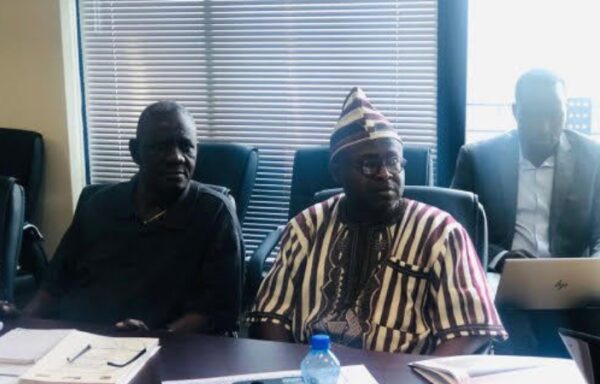StaTact impact stories - Building partnerships for national development
Oct 28, 2021
Location

Mr. Ibrahim M. Sesay
Chief Technical Adviser, Census at UNFPA, Liberia Country Office
Building partnerships for national development
Liberia, 2018. Mr. Sesay participated in the Regional StaTact workshop “Governance of data ecosystems for SDGs” in 2018 in Addis Ababa, Ethiopia. In attending this course, he expected to learn new tools to assess and use data from national statistics. The workshop was dedicated to tackling one national measurement problem to illustrate how the StaTact methodology can be used to solve local data needs. The Liberia team dealt with the issue of maternal mortality statistics in their country. Ultimately the team developed a national plan to improve maternal mortality data, which was later implemented, making the topic a top priority for vital statistical information. Before the workshop, data on maternal mortality was only partially collected, and the issue was highly stigmatized. Now, members of the Liberia delegation at the workshop have been instrumental in getting the authorities to set up a Maternal Neonatal Death Surveillance and Response (MNDSR) plan, and the maternal death review has become a national reportable event. Mr. Sesay attributes this success to primary elements they studied during the Building partnerships workshop.
Mr. Sesay had always considered building partnerships to be a good thing, but he realises that his definition was narrow until he participated in the workshop. Now, his understanding of partnerships includes not only “traditional” actors (i.e., government institutions and international organizations) but also all other players can be natural partners as well, including village communities, local government, private corporations, the media, independent consultants, and so on and so forth. Before the workshop, he would not imagine working with telecommunications companies and private TV stations to tackle development plans and collect data. He notes that his idea of resource mobilization was also limited. Before, he would always approach donors for financial support; now he understands that some donors may not be able to contribute monetarily, but many can provide alternative resources which are just as valuable. For Mr. Sesay, greater involvement in data production from a variety of different actors might result in higher levels of trust in the data produced, and hence, lead to more actors using the data.
After the workshop, Mr. Sesay returned home with the idea of creating a national data ecosystem in Liberia, where they can unite government, data users and producers together with non-traditional data source representatives, such as CSOs and the private sector. He believes that information should be available to everyone who needs it. With this idea in mind, the UNFPA team in Liberia see the DHS and national census data collection processes as an opportunity to apply the knowledge they learned during the workshop and as a way of getting everybody around the table. Another change in day-to-day working practices was the strengthening of existing partnerships to simplify Computer-Assisted Personal Interviews (CAPI) data collection tools and make them more user-friendly. When we talked with Mr. Sesay, the organization was building alliances with telephone companies to improve data storage from surveys and the coming census in remote areas. Mr. Sesay identifies his own personal motivation and confidence, as well as the support from his supervisor and team as the key factors that enabled him to apply the knowledge gained during the workshop. He feels proud of being part of the team that is making a change.
In Mr. Sesay’s words, “Data is a type of software for national development, you do not immediately see its value, but it contributes to different sectors of national development”. He told us that in UNFPA Liberia, they foresee development planning based on informed fundamental background, then people do not just do planning and programme implementation because they want to, they are informed by solid data and information. This process facilitates the identification of the country’s needs and, based on the data, enables us to make informed decisions.
For Mr. Sesay, data is a public good that needs to be generated and shared collectively. It should come from everybody and be accessible to everyone. In December 2019, his team was in the process of conducting a pilot of the national data ecosystem project, for which they organized preliminary training with support from the World Bank. Additionally, when we spoke in January 2020, a project on improving data regarding gender-based violence was underway. taking place when we talked with him in January 2020, following in the spirit of including a diversity of stakeholders. Mr. Sesay suggests expanding the coverage of the workshops to neighbouring countries and increasing the number of online workshops for people who cannot travel, as he sees a lot of value in the programme.
In our most recent exchange with Mr. Sesay, he told us about the ongoing census programme at UNFPA and their plans to use the StaTact platform:
“With the ongoing census programme at UNFPA, in 2021, motivated by the desire to create a common platform for data producers and users and as the Chief Technical Adviser for the Census, UNFPA has moved the Liberia Institute of Statistics and Geo-Information Services (LISGIS) from physical servers to cloud technology for data storage and sharing, and satellite imagery for census mapping. With these capabilities, Liberia will conduct the first 100%digital census in Africa in March 2022. We will be using the StaTact workshop tools to further evaluate the current data ecology and to identify the weaknesses, strengths, opportunities and threats to our new integrated digital data system”.
*The Impact story has been prepared and published by UNITAR and can be accessed here.
